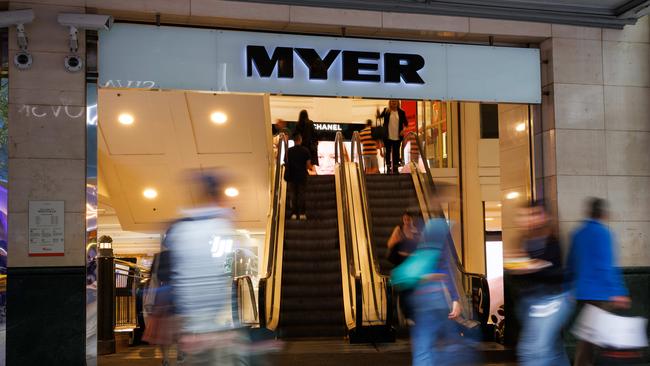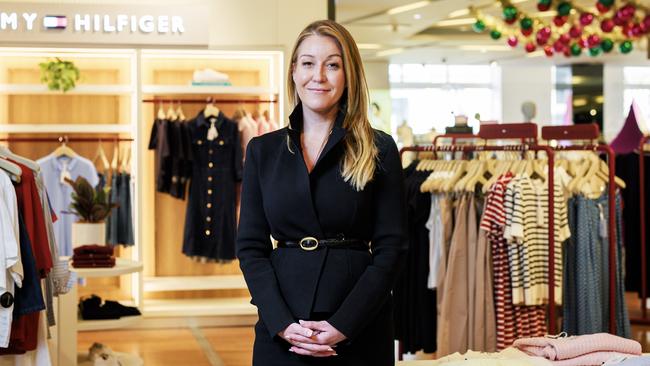Myer and Solomon Lew’s Premier Investments shares hammered on poor sales ahead of merger vote
The department store chain’s share price has tumbled below a key threshold set by the independent expert backing its near $1bn merger with Solomon Lew’s Premier retail assets.

Shock profit warnings wiped $1bn from the value of Myer and Premier Investment shares on Monday and cast a shadow over the fairness of their apparel business deal, which goes to a shareholder vote next week.
Myer’s warning of sluggish sales and earnings in the 22 weeks to December, covering its major earnings period of Black Friday, Christmas and Boxing Day, triggered a sharp share sell-off, which spread to Premier Investments after it also warned of a deteriorating performance
Shares in Myer, led by former Qantas Loyalty boss Olivia Wirth, tumbled 23.1 per cent to 88c on Monday, reducing its market cap by nearly $225m to $737m.
Premier Investments plunged by 15.9 per cent to $27.78, sending its market value spiralling almost $840m lower to $4.4bn.
Myer last October made a bid to buy five fashion brands (Just Jeans, JayJays, Portmans, Dotti and Jacqui-E) from Premier Investments’ apparel division in exchange for $950m.
Monday’s sell-off has seen Myer shares now trade below the lower end of the range (92.5c to $1.195) identified by independent expert Kroll as “fair and reasonable”. Both Myer and Premier Investment shareholders will vote on the deal next week.
Wilson Asset Management is both a Myer and Premier shareholder, and portfolio manager Oscar Oberg told The Australian that while both trading updates were disappointing, it only reinforced the need to merge the two entities into one.
“If anything, this update is more of a reason to do the merger, because you’re doing it at the bottom of the market, and you’ll get all of the upside of synergies and a better consumer environment once it all comes together,” he said. “From Myer’s perspective the merger gives more scale advantages and a more focused business under the leadership of Olivia Wirth that is focused on top-line sales growth.”

Myer told the market on Monday that its year-to-date financial performance was affected by factors including challenging macroeconomic conditions, increased costs and ramp-up complexity at the new national distribution centre in Ravenhall, which had also delayed the realisation of expected benefits.
Comparable sales for Myer in the 22 weeks to December 28 were in line with the prior corresponding period (PCP), while total sales were about $1.59bn, down 0.8 per cent on PCP.
Group online sales rose 2.8 per cent and represented 22 per cent of total sales in the period.
Operating gross profit was down $15m on the prior period to about $560m, while earnings before interest and taxes (pre-AASB16 basis) was $48m, a decrease of about $16m.
Ms Wirth said the current economy had proved to be challenging for retailers as households had been forced to cut back on discretionary purchases to combat the rising cost of living.
“In challenging trading conditions for the retail sector driven by a tough macroeconomic environment, Myer’s year-to-date sales performance has been stable,” she said. “Trading during last year’s key sales events including Black Friday was strong, but consumers remain cautious and focused on value given persistent cost-of-living pressures.”
Data from the Australian Bureau of Statistics last week showed retail spending rose by 0.8 per cent in November, which encompasses Black Friday, but undershot economists’ expectations of a 1 per cent increase, with consumers remaining cautious.

Premier Investments were the hardest hit in sales through the period, with first-half earnings now expected to be off as much as 21 per cent. It told the market that its Apparel Brands business will deliver sales in the range of $405m to $412m and underlying EBIT of $31m to $35m, $16m to $20m less than the same period a year ago.
Both groups have scheduled shareholder votes on the merger next week. The enlarged Myer will add 719 stores and take total staff to 17,300 in Australia and New Zealand, and annual sales of more than $4bn.
Under the terms of the merger deal, Myer will issue hundreds of millions of new shares to Premier Investments in return for brands including Just Jeans, Dotti and Portmans to be folded into the department store.
Existing Myer shareholders will hold 48.5 per cent of shares in the enlarged retailer, while Premier shareholders will own 51.5 per cent. Following the deal, Lew’s private vehicle Century Plaza will emerge with 26.8 per cent.
The earnings downgrade by Myer has sparked concern about the price Myer is paying to acquire Premier’s fashion brands when the market is turning down.
A source told The Australian the takeover would be a disaster for Myer if the group paid seven or eight times on $89m earnings before interest and tax, adding that the 35 per cent loss of EBIT in clothing brands means it could not get the prospectus target.
Myer remained committed to the merger vote on January 23. It told shareholders that it continued to see significant opportunity from the proposed combination to deliver a step-change in its market position and generate substantial strategic and financial benefits.
“Myer independent directors unanimously support the proposed combination, intend to vote in favour of the combination resolution at the meeting, and unanimously recommend that Myer shareholders also vote in favour of the combination resolution, subject to the independent expert continuing to conclude that the combination is either fair and reasonable, or not fair, but reasonable to non-associated Myer shareholders.”
Mr Oberg added that a merger would allow Premier management to focus on its two global rollout strategies in Smiggle and Peter Alexander. Documents leaked to The Australian last month showed sales from Premier’s three maiden stores are trading 61.6 per cent below budget for its popular sleepwear brand Peter Alexander in the UK.






To join the conversation, please log in. Don't have an account? Register
Join the conversation, you are commenting as Logout